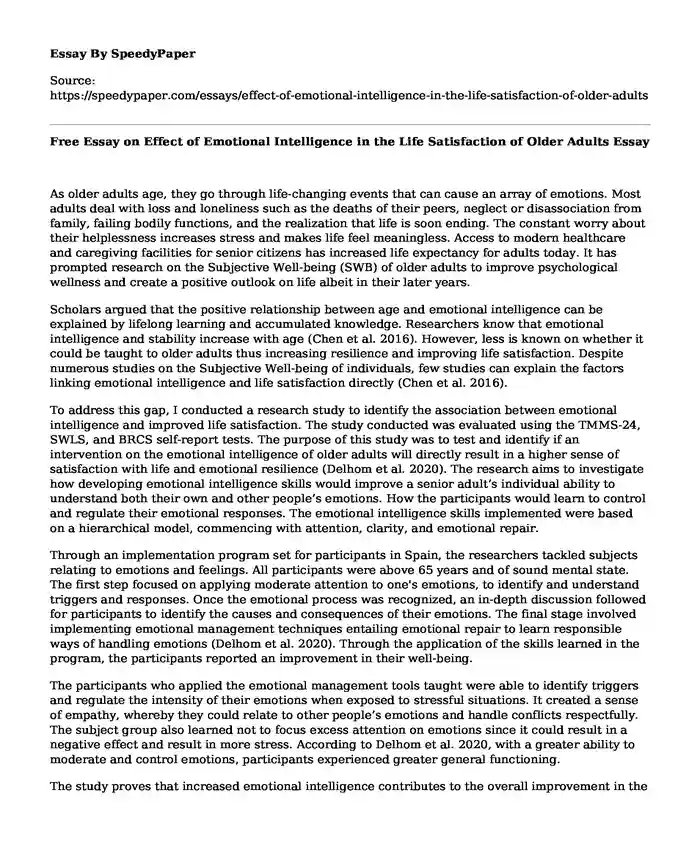
| Essay type: | Persuasive essays |
| Categories: | Social psychology Stress Emotional intelligence Lifespan development |
| Pages: | 3 |
| Wordcount: | 651 words |
As older adults age, they go through life-changing events that can cause an array of emotions. Most adults deal with loss and loneliness such as the deaths of their peers, neglect or disassociation from family, failing bodily functions, and the realization that life is soon ending. The constant worry about their helplessness increases stress and makes life feel meaningless. Access to modern healthcare and caregiving facilities for senior citizens has increased life expectancy for adults today. It has prompted research on the Subjective Well-being (SWB) of older adults to improve psychological wellness and create a positive outlook on life albeit in their later years.
Scholars argued that the positive relationship between age and emotional intelligence can be explained by lifelong learning and accumulated knowledge. Researchers know that emotional intelligence and stability increase with age (Chen et al. 2016). However, less is known on whether it could be taught to older adults thus increasing resilience and improving life satisfaction. Despite numerous studies on the Subjective Well-being of individuals, few studies can explain the factors linking emotional intelligence and life satisfaction directly (Chen et al. 2016).
To address this gap, I conducted a research study to identify the association between emotional intelligence and improved life satisfaction. The study conducted was evaluated using the TMMS-24, SWLS, and BRCS self-report tests. The purpose of this study was to test and identify if an intervention on the emotional intelligence of older adults will directly result in a higher sense of satisfaction with life and emotional resilience (Delhom et al. 2020). The research aims to investigate how developing emotional intelligence skills would improve a senior adult’s individual ability to understand both their own and other people’s emotions. How the participants would learn to control and regulate their emotional responses. The emotional intelligence skills implemented were based on a hierarchical model, commencing with attention, clarity, and emotional repair.
Through an implementation program set for participants in Spain, the researchers tackled subjects relating to emotions and feelings. All participants were above 65 years and of sound mental state. The first step focused on applying moderate attention to one's emotions, to identify and understand triggers and responses. Once the emotional process was recognized, an in-depth discussion followed for participants to identify the causes and consequences of their emotions. The final stage involved implementing emotional management techniques entailing emotional repair to learn responsible ways of handling emotions (Delhom et al. 2020). Through the application of the skills learned in the program, the participants reported an improvement in their well-being.
The participants who applied the emotional management tools taught were able to identify triggers and regulate the intensity of their emotions when exposed to stressful situations. It created a sense of empathy, whereby they could relate to other people’s emotions and handle conflicts respectfully. The subject group also learned not to focus excess attention on emotions since it could result in a negative effect and result in more stress. According to Delhom et al. 2020, with a greater ability to moderate and control emotions, participants experienced greater general functioning.
The study proves that increased emotional intelligence contributes to the overall improvement in the personal development of older adults and increased life satisfaction. Understanding the concept that life is a constant rollercoaster of emotions and that mastery of one’s own emotions builds the resilience needed to adapt to adversity. Stress management techniques of attention, clarity, and emotional repair equip individuals to confront problems or difficult situations confidently by looking at obstacles as challenges rather than threats (Delhom et al. 2020).
References
Chen, Y., Peng, Y., & Fang, P. (2016). Emotional Intelligence Mediates the Relationship between Age and Subjective Well-Being. The International Journal of Aging and Human Development, 83(2), 91–107. https://doi.org/10.1177/0091415016648705
Delhom, I., Satorres, E., & Meléndez, J. C. (2020). Can We Improve Emotional Skills in Older Adults? Emotional Intelligence, Life Satisfaction, and Resilience. Psychosocial Intervention, 000–000. https://doi.org/10.5093/pi2020a8
Cite this page
Free Essay on Effect of Emotional Intelligence in the Life Satisfaction of Older Adults. (2023, Nov 13). Retrieved from https://speedypaper.net/essays/effect-of-emotional-intelligence-in-the-life-satisfaction-of-older-adults
Request Removal
If you are the original author of this essay and no longer wish to have it published on the SpeedyPaper website, please click below to request its removal:
- Role of Race in American Foreign Policy - Essay Example
- Academic Essay on a Counselling Video
- Essay Sample on Pima County Population Demographics
- Essay Example on Minorities or Discrimination in Policing
- Essay Sample. Coaching Model Assignment
- Film Studies. Free Essay Sample
- Free Paper Sample on Organisational Problem Analysis
Popular categories




